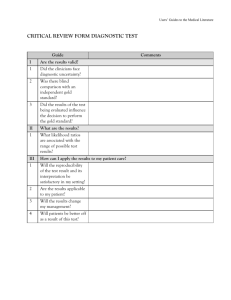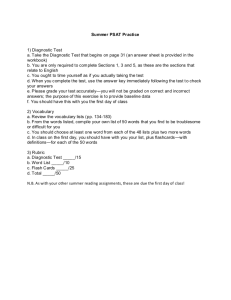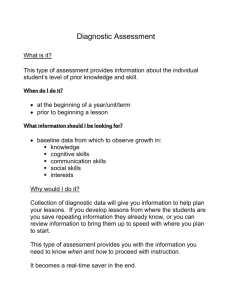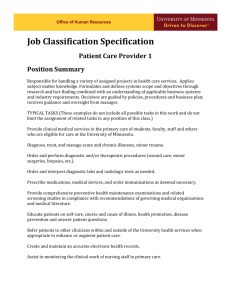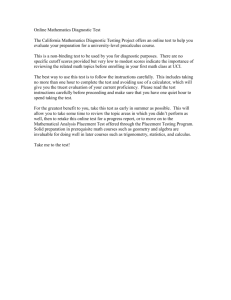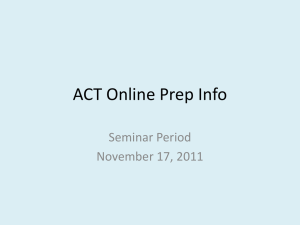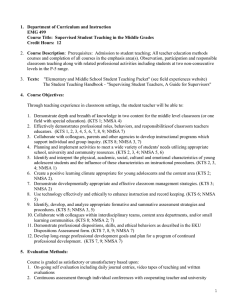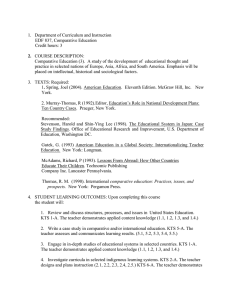College of Education - Eastern Kentucky University
advertisement
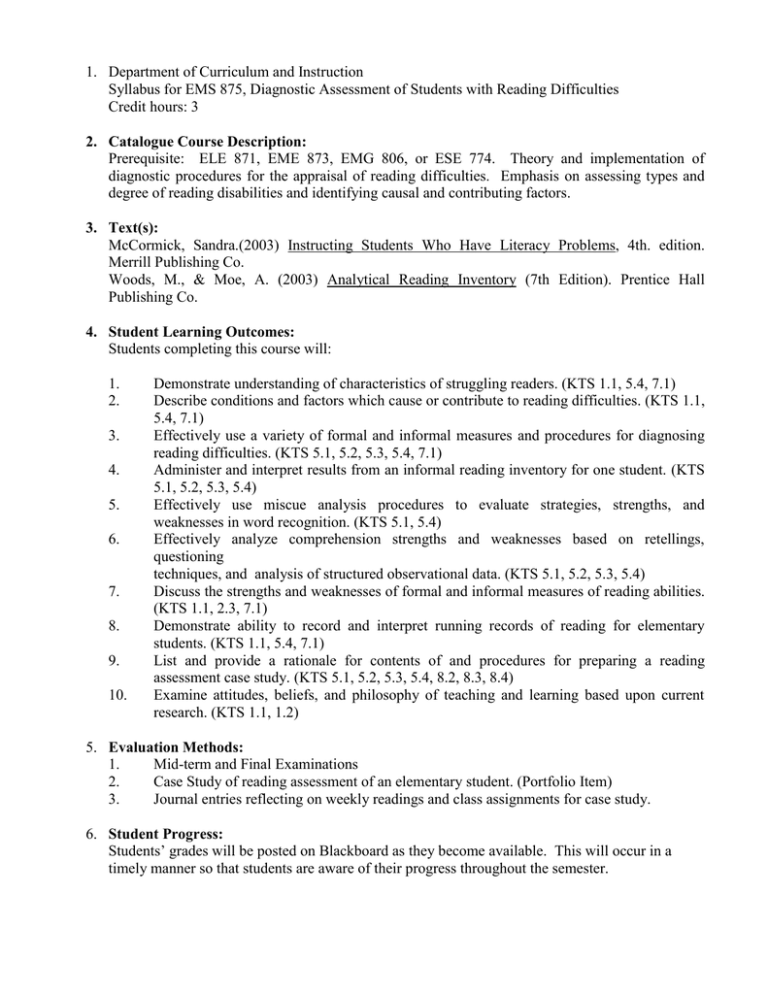
1. Department of Curriculum and Instruction Syllabus for EMS 875, Diagnostic Assessment of Students with Reading Difficulties Credit hours: 3 2. Catalogue Course Description: Prerequisite: ELE 871, EME 873, EMG 806, or ESE 774. Theory and implementation of diagnostic procedures for the appraisal of reading difficulties. Emphasis on assessing types and degree of reading disabilities and identifying causal and contributing factors. 3. Text(s): McCormick, Sandra.(2003) Instructing Students Who Have Literacy Problems, 4th. edition. Merrill Publishing Co. Woods, M., & Moe, A. (2003) Analytical Reading Inventory (7th Edition). Prentice Hall Publishing Co. 4. Student Learning Outcomes: Students completing this course will: 1. 2. 3. 4. 5. 6. 7. 8. 9. 10. Demonstrate understanding of characteristics of struggling readers. (KTS 1.1, 5.4, 7.1) Describe conditions and factors which cause or contribute to reading difficulties. (KTS 1.1, 5.4, 7.1) Effectively use a variety of formal and informal measures and procedures for diagnosing reading difficulties. (KTS 5.1, 5.2, 5.3, 5.4, 7.1) Administer and interpret results from an informal reading inventory for one student. (KTS 5.1, 5.2, 5.3, 5.4) Effectively use miscue analysis procedures to evaluate strategies, strengths, and weaknesses in word recognition. (KTS 5.1, 5.4) Effectively analyze comprehension strengths and weaknesses based on retellings, questioning techniques, and analysis of structured observational data. (KTS 5.1, 5.2, 5.3, 5.4) Discuss the strengths and weaknesses of formal and informal measures of reading abilities. (KTS 1.1, 2.3, 7.1) Demonstrate ability to record and interpret running records of reading for elementary students. (KTS 1.1, 5.4, 7.1) List and provide a rationale for contents of and procedures for preparing a reading assessment case study. (KTS 5.1, 5.2, 5.3, 5.4, 8.2, 8.3, 8.4) Examine attitudes, beliefs, and philosophy of teaching and learning based upon current research. (KTS 1.1, 1.2) 5. Evaluation Methods: 1. Mid-term and Final Examinations 2. Case Study of reading assessment of an elementary student. (Portfolio Item) 3. Journal entries reflecting on weekly readings and class assignments for case study. 6. Student Progress: Students’ grades will be posted on Blackboard as they become available. This will occur in a timely manner so that students are aware of their progress throughout the semester. 7. Attendance Policy: Absences equating 20% of class meetings will result in automatic failure. Class sessions missed as a result of late entry will be counted as absences. The student is responsible for presenting adequate reason for absence to the instructor in order to be given opportunity to make up missed work. (Adequate reasons include personal illness, death or serious illness in the immediate family, or participation in an approved university activity). 8. Last Date to Drop the Course: Last day to drop course or to withdraw from the University are included in the class schedule. 9. Disability Statement: If you are registered with the Office of Services for Individuals with Disabilities, please make an appointment with the course instructor to discuss any academic accommodations you need. If you need academic accommodations and are not registered with the Office of Services for Individuals with Disabilities, please contact the Office on the third floor of the Student Services Building, by email at disserv@eku.edu or by telephone at (859)622-2933 V/TDD. Upon individual request, this syllabus can be made available in alternative forms. 10. Academic Integrity Statement: Students are advised that EKU’s Academic Integrity policy will strictly be enforced in this course. The Academic Integrity policy is available at www.academicintegrity.eku.edu. Questions regarding the policy may be directed to the Office of Academic Integrity. 11. Course Requirements; Students will: 1. Participate in class discussion of assigned readings 2. Review and discuss possible causes of reading problems based on information from assigned readings 3. Examine and evaluate a sample of diagnostic instruments and techniques 4. Administer selected diagnostic instruments to an elementary student, interpret results, and discuss these with the student. 12. Course Outline: 1. Reading disability a. Characteristics b. Distinction from learning disability, developmental delay, and/or limited mental capacity c. Developmental, corrective, and remedial literacy programs d. The importance of early intervention for corrective and remedial reading needs 2. Review of current researched based factors causing or contributing to reading deficits a. Physical (1) Vision (2) Hearing b. 3. 4. (3) Speech Environmental: Experiential, cultural, and socioeconomic (1) Home (2) School (3) Community c. Developmental (1) Cognitive (2) Linguistic (3) Perceptual (4) Social-emotional (5) Psychological Diagnostic instruments and procedures for assessing or screening a. Physical problems (1) Visual (a) Teacher observation (b) Referral process and collaboration with specialist (2) Auditory (a) Teacher observation (b) Audiometer (c) Referral to specialist (3) Speech/Articulation (a) Teacher observation (b) Teacher-made articulation tests (c) Referral to specialist b. Cognitive development (1) Academic records (2) Intelligence and achievement tests (3) Teacher observation (a) Attention span (b) Vocabulary (c) Oral expression (d) Oral comprehension c. Linguistic development (1) Vocabulary tests (2) Teacher observation (a) Vocabulary (b) Sentence structure d. Perceptual development (1) Visual - Readiness tests (2) Auditory (a) Readiness tests (b) Auditory Discrimination Tests e. Social-emotional and psychological development (1) Interest inventories (2) Teacher observation Diagnostic instruments and procedures for diagnosing specific reading difficulties a. Standardized Reading survey tests 5. (1) Gates MacGinitie Reading Tests (K-12) (2) Stanford Achievement Test (1.6-9.9) (3) State and National Assessments b. Informal Reading Inventories (1) Basal reader components (2) Teacher-developed (3) Classroom Reading Inventory (Silvaroli) (4) Ekwall Reading Inventory (5) Analytical Reading Inventory (Woods & Moe) c. Emergent Literacy Assessments (1) Comcepts about Print (2) Marie Clay's Diagnostic Survey d. Running Records e. Diagnostic Reading Tests (1) Diagnostic Reading Scales (Spache) (2) Durrell Analysis of Reading Difficulty (3) Gates-McKillop-Horowitz Reading Diagnostic Tests (4) Stanford Diagnostic Reading Test (5) Woodcock Reading Mastery Test (6) Cloze tests f. Other instruments related to special needs or interests may be examined. g. Computer software for reading diagnosis h. Other instruments related to special needs or interests may be examined. Case studies of reading difficulties a. Components of a comprehensive reading case study b. Procedures for gathering information c. Format for reporting a case study Official E-mail: An official EKU e-mail is established for each registered student, faculty, and staff member. All university communications sent via e-mail will be sent to this EKU e-mail address. Course P/N EMS 875 Course Title Diagnostic Assessment of Students with Reading Difficulties RELATIONSHIP TO: College of Education Conceptual Framework K- Basic Knowledge, A- Application, PA- Portfolio Artifact, KA 1, 2, 3, 4, 5, 6- Key Assessments CF1 CF2 CF3 CF4 CF5 K,A A,PA K K,A Kentucky Teacher Standards – Advanced K- Basic Knowledge, A- Application, PA- Portfolio Artifact, KA 1, 2, 3, 4, 5, 6- Key Assessments TS1 TS2 TS3 TS4 TS5 TS6 TS7 TS8 TS9 TS10 A A,PA A,PA A,PA A,PA A EKU Goals EKU-G1 EKU–G2 EKU-G3 X EKU-G4 X EKU-G5 X KERA Initiatives N/A to graduate programs in the Reading/Writing MAED program. Identify the initiative number(s) for each category Learner Program of Program of Goals/Academic Studies: Studies: Skills Expectations Understandings & Concepts N/A N/A N/A Core Content N/A EPSB Themes K- Basic Knowledge, A- Application, PA- Portfolio Artifact, KA 1, 2, 3, 4, 5, 6- Key Assessments Code of Leadership COURSES Diversity Technology Literacy Ethics EMS 875 K,A K,A A,PA K K,A SPA STANDARD NAME GOES HERE
